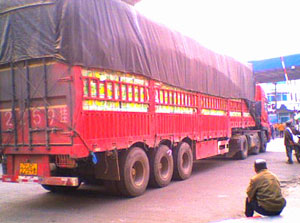The junta’s ban against cross-border trade with the Kachin Independence Organization (KIO) is affecting the business of Chinese investors in banana farms in Burma’s Northern Kachin State ...
The junta’s ban against cross-border trade with the Kachin Independence Organization (KIO) is affecting the business of Chinese investors in banana farms in Burma’s Northern Kachin State, border traders said.
 Chinese investors are losing millions of Yuan during the present banana harvest because they have been banned for 12 days from transporting bananas from their rented farms in southeastern Kachin State across the border to China, according to the traders.
Chinese investors are losing millions of Yuan during the present banana harvest because they have been banned for 12 days from transporting bananas from their rented farms in southeastern Kachin State across the border to China, according to the traders.
The ban on bananas started November 25th at 6 a.m., local time, at the junta controlled Lajayang Checkpoint, which is the main trade corridor to Laiza, the business center and headquarters of the KIO on the China-Burma border, they said.
Before the ban, about 20 truckloads, carrying over 30 tons of bananas from the rented farms in “Shadan Pa”, in the KIO controlled Daw Hpum Yang sub-township, in Manmaw (Bhamo) district, crossed into to China everyday, according to local eyewitnesses.
There are over 40,000 acres of banana trees in Shadan Pa, all owned by Chinese investors. The produce is exported back to China and to foreign markets, said sources from the banana farms.
Hundreds of Chinese, and thousands of Burmese workers, are employed in the fields, workers said.
Chinese banana filed workers has also been banned by military authorities from entering Burma at Lajayang Checkpoint, the border traders added.
The sources said Chinese businessman Lao Ying, from Yingjiang, in Yunnan, has invested in the banana farms since the timber production dropped in Kachin State in early 2008.
The two countries’ border imports and exports at Laiza have to cross at the Lajayang Checkpoint. Laiza became the main border trade door in Kachin State after the KIO signed a ceasefire agreement with the junta in 1994.
China, the main ally of the Burmese military regime does not like civil war with ethnic armed groups or political instability in neighboring Burma because of its huge investment in the country of over 600 billion US dollars, mainly in the energy and mining sectors.
China is pressuring both the junta and the armed ethnic groups to avoid civil war, sources close to Chinese authorities said.
The Chinese government has warned its citizens for the last two weeks to avoid travelling in Kachin State and Shan State, because of the possibility of clashes between the Burmese army and armed ethnic groups, border traders said.



